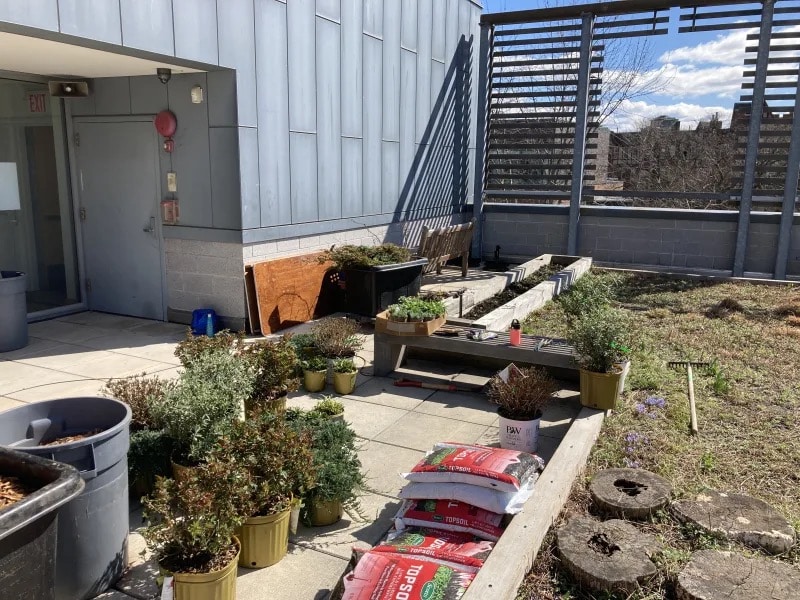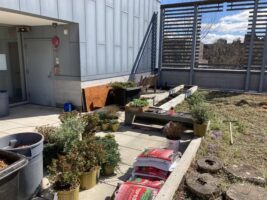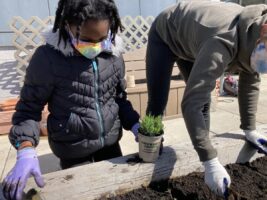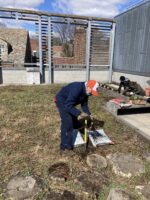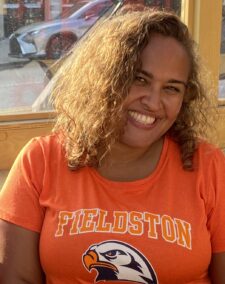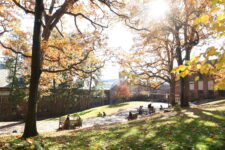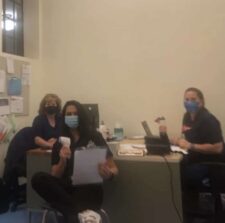With Earth Day on April 22, many within the Ethical Culture Fieldston School community are thinking of ways to protect the environment that go far beyond recycling. In keeping with its tenet of being interdependent with the world at large, the School has already taken major steps in its commitment to environmental sustainability — and some of them may surprise you.
Want to know more? Here are eight innovative ways ECFS is going green.
1. A new standard for architectural design
Fieldston Middle is housed in a LEED Silver-certified building, making it a standout for eco-conscious design among New York independent schools. Its features include waterless urinals and low-flush toilets, motion-activated light sensors and sink faucets, an interactive Green Roof for faculty and students, and a separate roof space populated by low-water plants.
According to Howie Waldman, Fieldston Upper Science Teacher and Green Dean, the top-level roof helps to absorb water that would otherwise overwhelm New York’s sewage system. It also acts as insulation for the building, mitigating the environmental toll and financial costs of heating and cooling. Finally, in conjunction with the interactive Green Roof, the top-level roof serves as a natural habitat for butterflies and other pollinators, fostering ecologically sustainable habitats even beyond the school grounds.
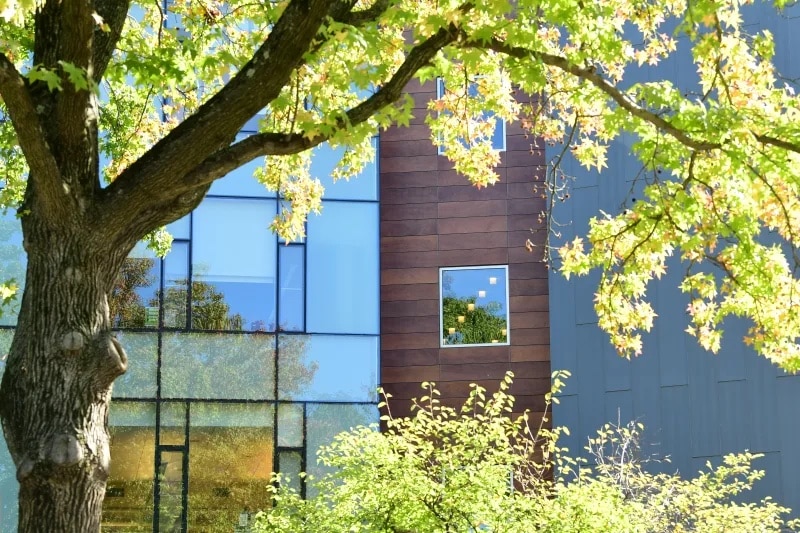
2. A slice of nature on the Green Roof
Since its inception, the Green Roof has evolved with the School, explains John Baglio, Fieldston Middle Engineering Teacher and Green Roof Coordinator. In its current iteration, it’s become a welcome space for students to gather, take a mask break, and enjoy a little piece of fresh air and nature. New plantings and a redesigned path invite visitors to wend their way through the green space, rather than circle around it. Students in the Fieldston Middle Environmental Club plan to continue planting — focusing on native species — and making the space more welcoming.
“My biggest thing is to get kids into the garden space — that it’s not just something to walk around and look at, but walk into and among,” says Baglio.
3. Teaching climate change in the Fieldston Upper curriculum
With the looming threat of food crises, natural disasters, and eventual mass extinction, climate change is one of the most pressing scientific issues the world faces — and it’s one the Science Department has long hoped to integrate in the ECFS curriculum. Thanks to a Venture Grant developed by Fieldston Upper Science Teachers Judy Cheng, Palma Repole, and Ben Wearn, every new student in Fieldston Upper will now tackle climate change in their classes.
“We spent the summer coming up with really specific activities and projects, specific curricular work for each of the subjects,” explains Cheng. “Ultimately, we decided that to really learn and understand climate science, it’s not just doing one project, but rather incorporated and integrated and woven into the entire curriculum.”
Dedicated units in biology, chemistry, and physics ensure that students grapple with climate change in every scientific discipline. Beyond the core curriculum, students can pursue a deeper study in a climate change elective taught by Fieldston Upper Science Teacher Juan Botella.
Finally, in a tie-in to the Science Department’s diversity, equity, and inclusion initiatives, the curriculum will discuss the disproportionate effect that climate change has on different communities. “The goal is so students can be educated about what they’re reading in the news and in current events,” says Repole.
4. Bird-proof glass in the Tate Library
The sweeping floor-to-ceiling windows of the Tate Library offer stunning views of the Quad — but they also pose a hazard to birds, which are at risk of flying into the glass.
As part of the Tate’s comprehensive renovations in 2018, the School installed Ornilux glass, which uses a UV-reflective patterned coating that is imperceptible to humans but highly visible to birds. The result is a benefit to all of the library’s patrons, who can enjoy looking out onto a Fieldston campus populated by our avian friends.
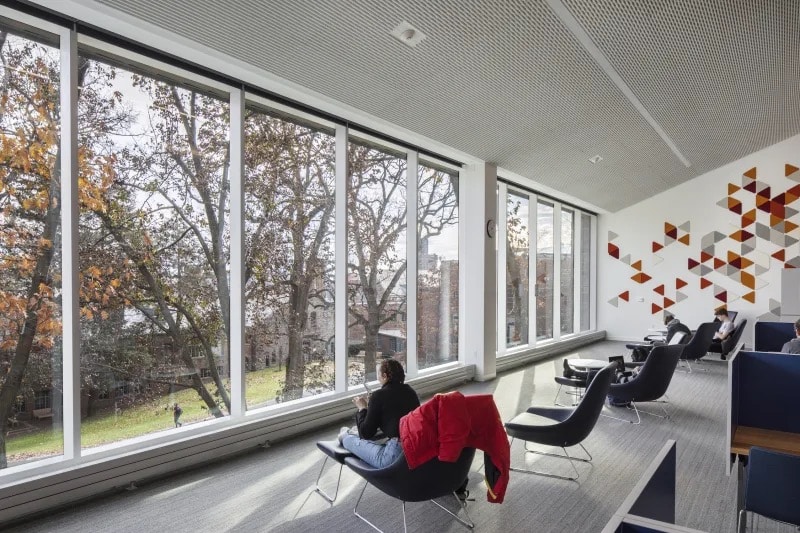
5. Sustainability in what we eat
From sourcing to serving to waste, ECFS makes an effort to ensure that every part of the dining process is sustainable, explains Amy Van Tassell, Resident Director of Dining Services. Where possible, food products are sourced locally from New York, New Jersey, and Pennsylvania, and all meat and dairy products must be hormone-free. Over the past few years, the Dining Services team has dramatically reduced its reliance on single-use plastic products, opting instead for products that are reusable or 100% compostable, recyclable, or biodegradable. And when it comes to food waste, constant monitoring of user feedback ensures that what’s uneaten is minimal; leftover meals are donated or provided to nighttime Security and Facilities teams.
6. Making vegetable bits into organic gold
If you’ve ever seen meal prep at a commercial kitchen, you’ve realized that a good portion of ingredients ends up in the trash bin. Thankfully, there’s an alternative.
For the past decade and a half, the Fieldston Upper Environmental Club has been composting all pre-consumer waste from the cafeteria. Onion skins, broccoli stalks, and more are combined with fallen leaves gathered with the help of the Facilities team and composted on-site. That composted material can then be used to fertilize plantings on campus without adding the cost of gasoline and increasing the carbon footprint.
7. Firing up the car charging station
One of the least-publicized green initiatives at ECFS sits at the back of the Fieldston Upper gym, near the upper field: a charging station for electric cars. “We know that most teachers commute by car, so we wanted staff and faculty to have the option to buy a really energy-efficient vehicle,” explains Waldman.
Take a look the next time you walk by the Fieldston campus — you might just see a car plugged in!
8. Putting money toward renewable energy
An institution as large as ECFS requires a significant amount of electricity to run smoothly, explains Kyle Wilkie-Glass, Chief Operating Officer & Assistant Head of School for Strategic Initiatives. To offset its power consumption, the School has purchased renewable energy certificates to guarantee that 100% of its power is generated by renewable energy sources.
“It’s exciting moves like this that allow us to, over time, consider the utility impact on the environment,” says Wilkie-Glass.
